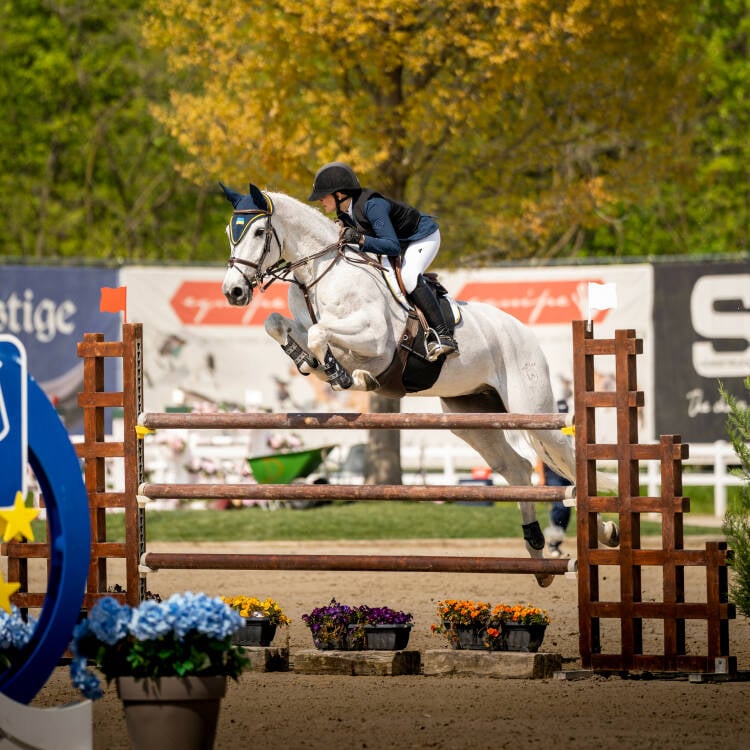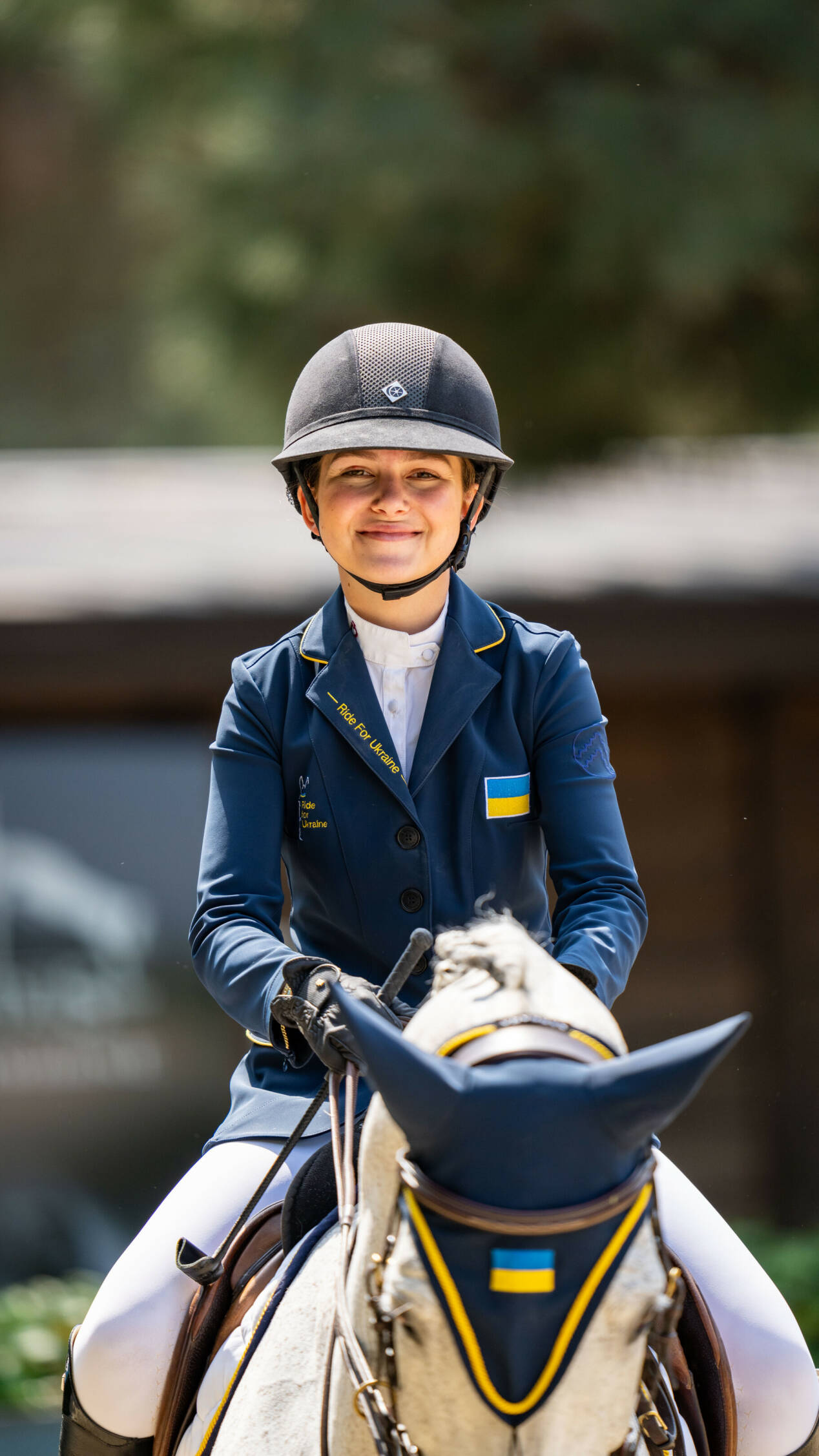
Ukraine has lost a lot of athletes to this war, “it’s sad for us to say but we have a lot of Olympic athletes that chose to fight for their country rather than leave. It’s important to understand that every one of us competing in Gorla right now is keeping the spot open for all of those who made the commitment to stay, as they gave it up for us to be here. So we carry them with us in our hearts and minds and those we lost.” Anastasia expresses with emotion. “But this war is something bigger, if we give up, we have no country.”
And it’s not just athletes who are impacted, Anastasia tells me about the incredible story of one of her grooms, “she was an amazing groom, but she was a military servant way before working with horses and when the war broke out, she had such a strong feeling of duty that she travelled from Vilamoura in Portugal back to Ukraine. But there were no aeroplanes, it was military skies in Ukraine, so she went by foot and bus and train just to be able to get back and serve her country.”
Given all of this, and the incredible pressure and unique circumstance the team finds themselves in, they put up a competitive display of show jumping to earn themselves 70 qualifier points in the Longines EEF Series last week, in their bid to make it to the Final in Warsaw later this year. “We’re not here to make up the numbers. Our primary goal is to qualify for Warsaw [Longines EEF Series Final] and we have to see if some of our riders can qualify for the Europeans along the way.” Tetiana says of their plans for the future, “And then of course future goals, we can only think about the possibility of the Olympics but that’s something we have to continue going along the road and see where it leads us.”
Twelve months on and the team are carrying on, but can still feel conflicted at times, “there’s not a day that goes by when our families, friends and fellow athletes back in Ukraine are not in our mind”, Tetiana says, and there are still times when athletes – not just in equestrian sport – question their decision to continue competing. “We’d say it’s very emotional for males in particular in our country’s teams, there are a lot of men that continue to fight the war and be recruited, and athletes feel like they’re not doing their duty or respecting their country, they feel like they’re not helping - even though we have tried to establish a mindset that they are representing their country on a different scale and they’re doing a duty here, an athletic commitment.” She explains, “but it’s difficult for them as the war is so central to us all and they feel like sometimes they are more needed there. Which is understandable to feel, but we’re very lucky to have them here we’re so privileged to be able to have a team to go to these shows and to be able to continue to talk about this.”
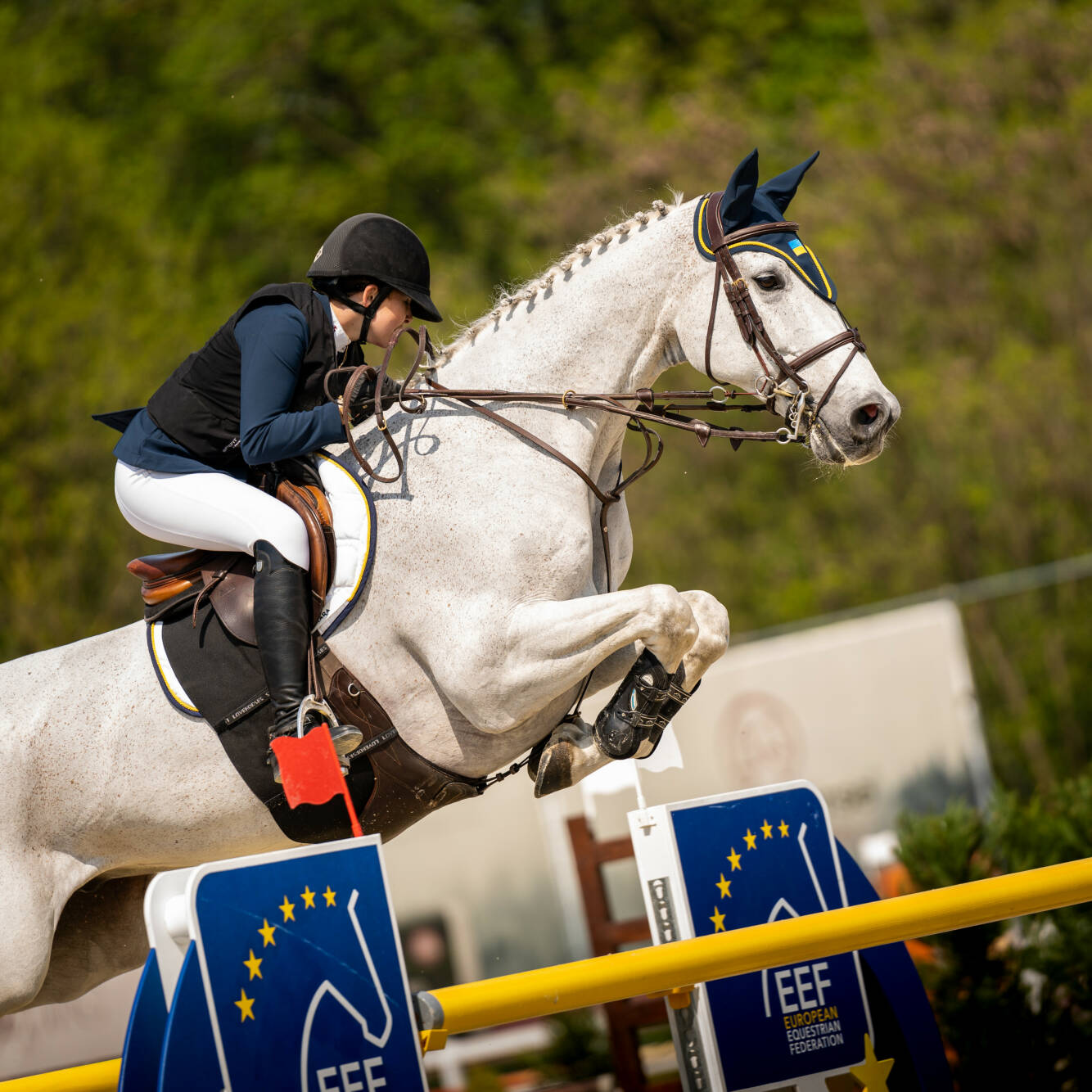
Tetiana Sheinich, Chef d’Equipe for the Ukrainian Nations Cup team, knew it was imperative for the team to still have a purpose, but in order to do this, she had to set objectives in an attempt to give them hope and something to focus on. “At the start of the war there was a huge effect on our athletes, it demotivated them and left them very unsure of their future and depressed – it impacted them not only emotionally but physically”, she tells me. Luckily for the team, the Ukrainian equestrian federation (UEF) acted quickly when the war broke out and made the decision very early on to transport the horses out of Ukraine. “It was a huge logistical operation, given that paperwork was still needed to transport the horses when the whole country just ceased operating overnight,” she said. “Everything stopped, everything collapsed, and offices were closed because we had no electricity. But we did manage to evacuate a lot of horses and the majority are now based in Belgium, Holland and Germany, although some horses were lost in the shelling and many barns have been totally demolished in the fighting.”
“The Federation and all of the members involved were determined to keep up the representation of Ukraine as we don’t just want our country to be seen in a warzone or on a battlefield, but to keep that up outside of Ukraine and spread the word throughout Europe. So it was very important to us to set strategic goals and plans for our athletes to have some sort of hope of tomorrow and find their motivation again.”
Without support from the EFU, EEF and the FEI Solidarity fund, it would not have been possible for the team to still attend such competitions, Tetiana tells me. “The federation help us immensely. The funding they gave to certain riders was then used for the whole team to travel to Nations Cups and everything else that was involved with that.”
But how does one focus on the competition at hand when such horrific events are unfolding back at home? “Our biggest challenge was when the war broke out, we were all on pause, all of our families were affected in one way or another and of course that has a huge impact upon you as an athlete, whether you’re in the country or not - if your family’s there, your life stops. You can’t just say to a person “there’s a nations cup on, let’s go!”, you have to take into account the tragedies of being back home and the death, the near death and the destruction - many people lost homes and loved ones within our team,” Anastasia explains.
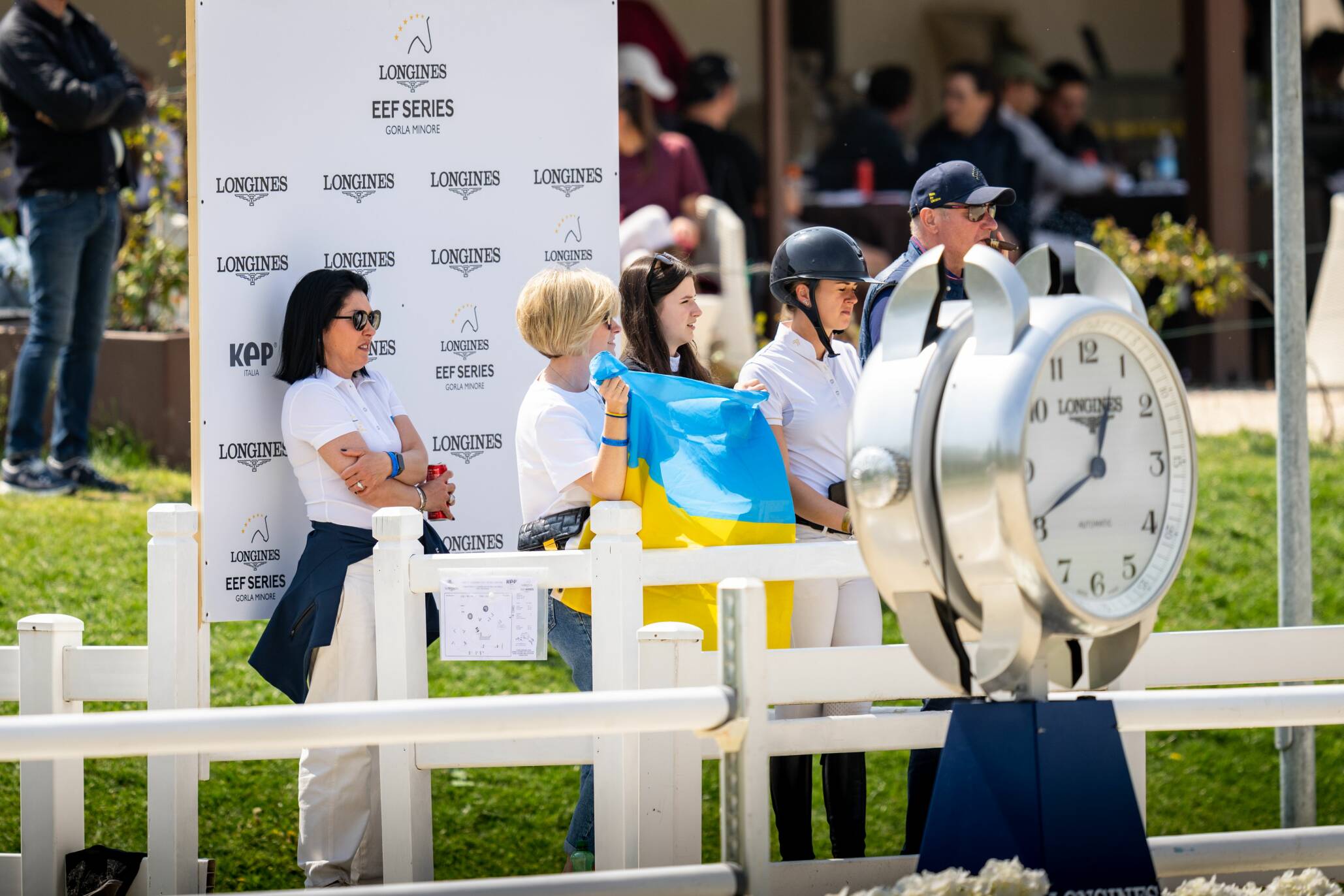
Imagine coming out of the arena with the feeling of having just completed the last show jumping round of your career, not because you’re retiring, or anything you have done, but because of a political war completely outside of your control that has forced you to flee your home, leaving your life in complete uncertainty. That was the experience of the Ukrainian show jumping rider Anastasia Bondarieva and her team just this time last year, and in the last 12 months, they have moved proverbial mountains in order to do be able to continue doing their job and represent their country.
“I remember that feeling so distinctly,” 20-year-old Anastasia tells me with tears in her eyes as she bravely describes the days after Russia first invaded her home country. “Everyone tries to put on a brave front, but of course, no one really knows - at that point it was all so unknown. And that is so tough when you see people making plans to go from one show to another and you don’t know whether you can even come back home, let alone what show you might be able to make next.”
“But it has been a year now and although it’s so exhausting, we’ve learned how to keep going. But I think people will never understand how draining, exhausting and truly heartbreaking it was at the time, and still is. I cannot even put it into words myself, but it really did feel like life had stopped, things just got blocked, the country just stopped working. You could not reach anyone you could not call anyone, banks were not working, offices were not working, you couldn’t reach your family, you couldn’t go back.”
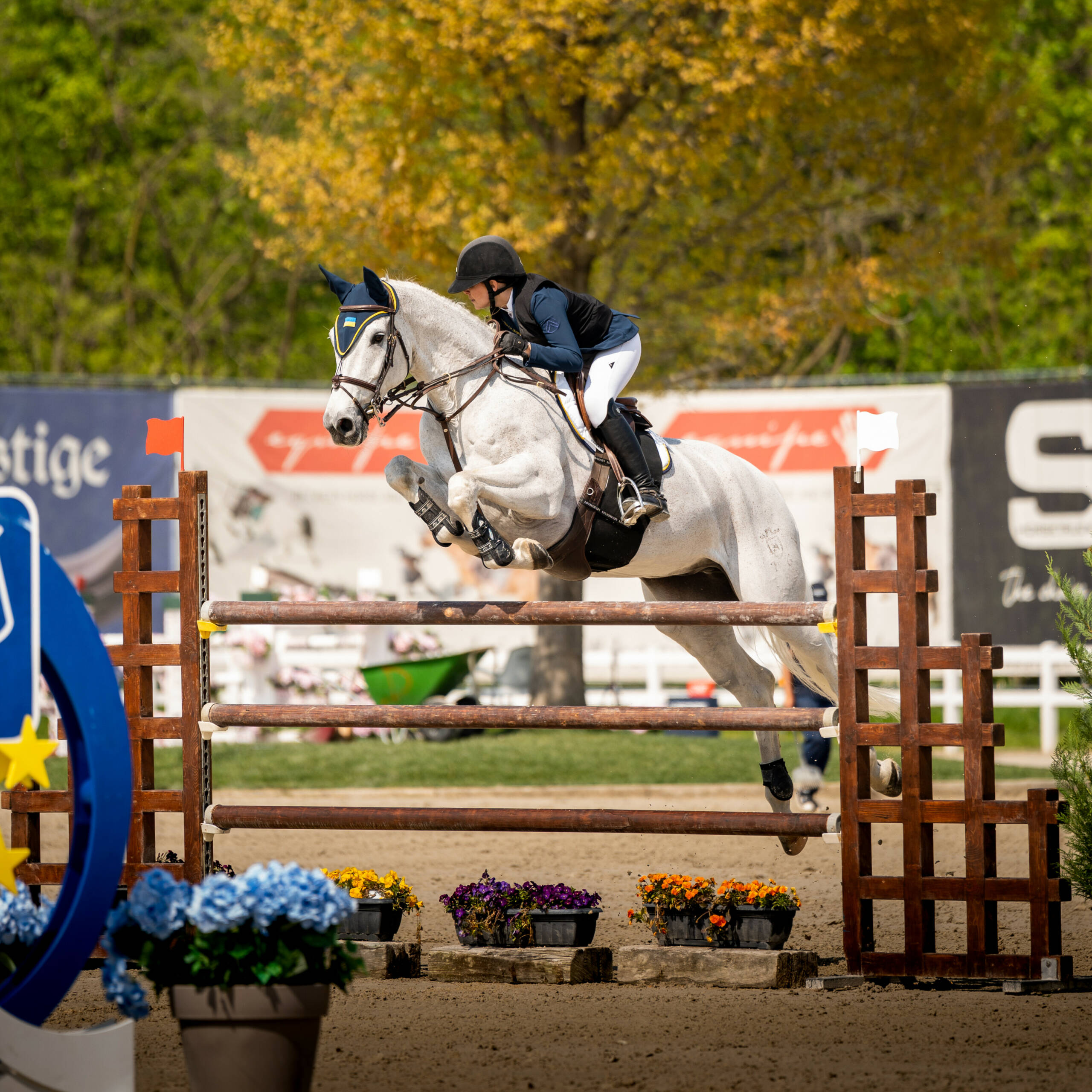
Ukraine has lost a lot of athletes to this war, “it’s sad for us to say but we have a lot of Olympic athletes that chose to fight for their country rather than leave. It’s important to understand that every one of us competing in Gorla right now is keeping the spot open for all of those who made the commitment to stay, as they gave it up for us to be here. So we carry them with us in our hearts and minds and those we lost.” Anastasia expresses with emotion. “But this war is something bigger, if we give up, we have no country.”
And it’s not just athletes who are impacted, Anastasia tells me about the incredible story of one of her grooms, “she was an amazing groom, but she was a military servant way before working with horses and when the war broke out, she had such a strong feeling of duty that she travelled from Vilamoura in Portugal back to Ukraine. But there were no aeroplanes, it was military skies in Ukraine, so she went by foot and bus and train just to be able to get back and serve her country.”
Given all of this, and the incredible pressure and unique circumstance the team finds themselves in, they put up a competitive display of show jumping to earn themselves 70 qualifier points in the Longines EEF Series last week, in their bid to make it to the Final in Warsaw later this year. “We’re not here to make up the numbers. Our primary goal is to qualify for Warsaw [Longines EEF Series Final] and we have to see if some of our riders can qualify for the Europeans along the way.” Tetiana says of their plans for the future, “And then of course future goals, we can only think about the possibility of the Olympics but that’s something we have to continue going along the road and see where it leads us.”
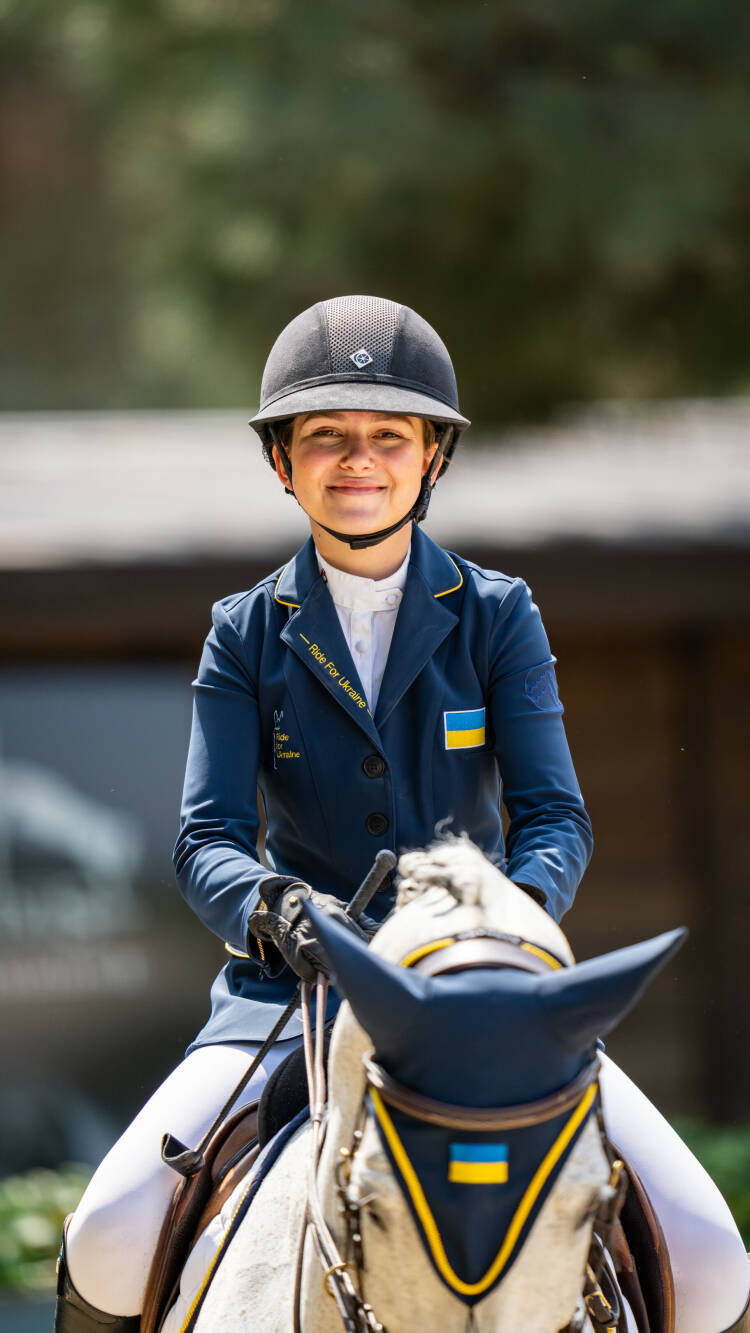
Twelve months on and the team are carrying on, but can still feel conflicted at times, “there’s not a day that goes by when our families, friends and fellow athletes back in Ukraine are not in our mind”, Tetiana says, and there are still times when athletes – not just in equestrian sport – question their decision to continue competing. “We’d say it’s very emotional for males in particular in our country’s teams, there are a lot of men that continue to fight the war and be recruited, and athletes feel like they’re not doing their duty or respecting their country, they feel like they’re not helping - even though we have tried to establish a mindset that they are representing their country on a different scale and they’re doing a duty here, an athletic commitment.” She explains, “but it’s difficult for them as the war is so central to us all and they feel like sometimes they are more needed there. Which is understandable to feel, but we’re very lucky to have them here we’re so privileged to be able to have a team to go to these shows and to be able to continue to talk about this.”
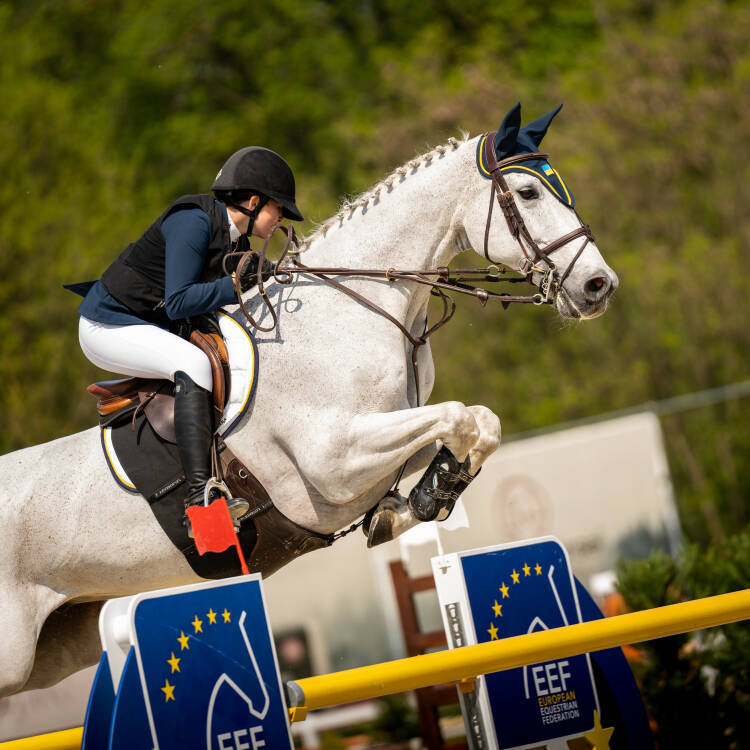
Tetiana Sheinich, Chef d’Equipe for the Ukrainian Nations Cup team, knew it was imperative for the team to still have a purpose, but in order to do this, she had to set objectives in an attempt to give them hope and something to focus on. “At the start of the war there was a huge effect on our athletes, it demotivated them and left them very unsure of their future and depressed – it impacted them not only emotionally but physically”, she tells me. Luckily for the team, the Ukrainian equestrian federation (UEF) acted quickly when the war broke out and made the decision very early on to transport the horses out of Ukraine. “It was a huge logistical operation, given that paperwork was still needed to transport the horses when the whole country just ceased operating overnight,” she said. “Everything stopped, everything collapsed, and offices were closed because we had no electricity. But we did manage to evacuate a lot of horses and the majority are now based in Belgium, Holland and Germany, although some horses were lost in the shelling and many barns have been totally demolished in the fighting.”
“The Federation and all of the members involved were determined to keep up the representation of Ukraine as we don’t just want our country to be seen in a warzone or on a battlefield, but to keep that up outside of Ukraine and spread the word throughout Europe. So it was very important to us to set strategic goals and plans for our athletes to have some sort of hope of tomorrow and find their motivation again.”
Without support from the EFU, EEF and the FEI Solidarity fund, it would not have been possible for the team to still attend such competitions, Tetiana tells me. “The federation help us immensely. The funding they gave to certain riders was then used for the whole team to travel to Nations Cups and everything else that was involved with that.”
But how does one focus on the competition at hand when such horrific events are unfolding back at home? “Our biggest challenge was when the war broke out, we were all on pause, all of our families were affected in one way or another and of course that has a huge impact upon you as an athlete, whether you’re in the country or not - if your family’s there, your life stops. You can’t just say to a person “there’s a nations cup on, let’s go!”, you have to take into account the tragedies of being back home and the death, the near death and the destruction - many people lost homes and loved ones within our team,” Anastasia explains.
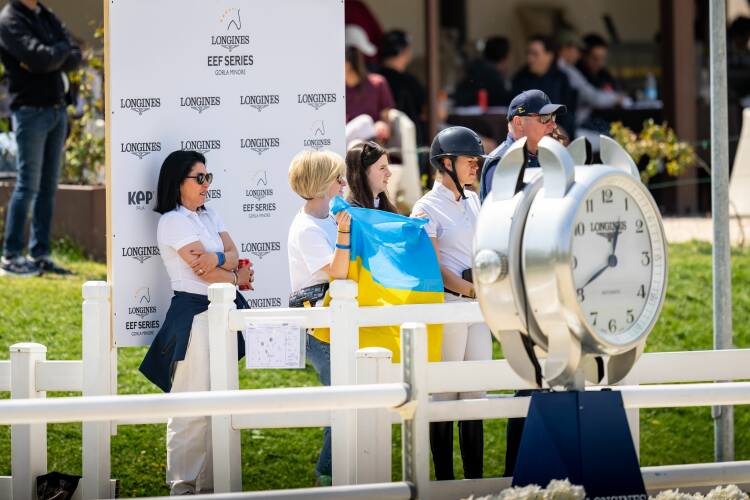
Imagine coming out of the arena with the feeling of having just completed the last show jumping round of your career, not because you’re retiring, or anything you have done, but because of a political war completely outside of your control that has forced you to flee your home, leaving your life in complete uncertainty. That was the experience of the Ukrainian show jumping rider Anastasia Bondarieva and her team just this time last year, and in the last 12 months, they have moved proverbial mountains in order to do be able to continue doing their job and represent their country.
“I remember that feeling so distinctly,” 20-year-old Anastasia tells me with tears in her eyes as she bravely describes the days after Russia first invaded her home country. “Everyone tries to put on a brave front, but of course, no one really knows - at that point it was all so unknown. And that is so tough when you see people making plans to go from one show to another and you don’t know whether you can even come back home, let alone what show you might be able to make next.”
“But it has been a year now and although it’s so exhausting, we’ve learned how to keep going. But I think people will never understand how draining, exhausting and truly heartbreaking it was at the time, and still is. I cannot even put it into words myself, but it really did feel like life had stopped, things just got blocked, the country just stopped working. You could not reach anyone you could not call anyone, banks were not working, offices were not working, you couldn’t reach your family, you couldn’t go back.”
